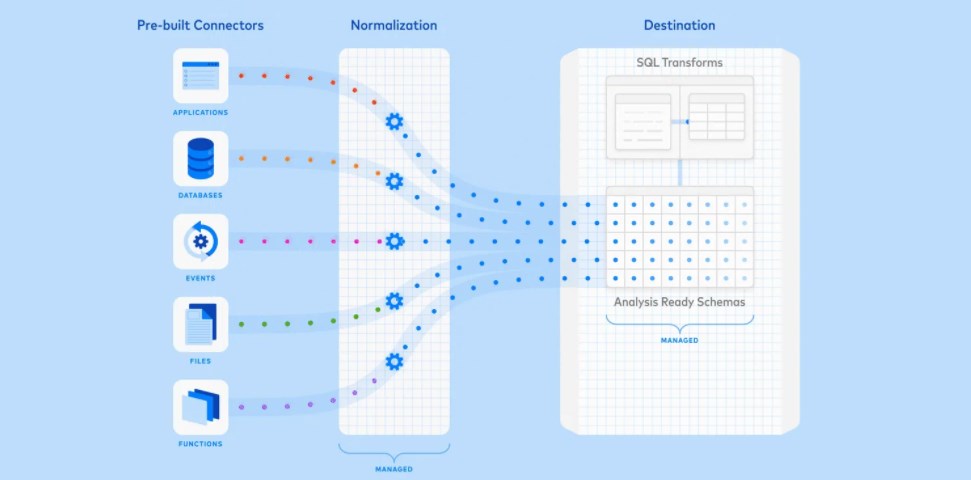Why invest in a data warehouse?
Before we talk about the benefits of cloud data storage, we need to understand why data storage is important. Investing in a data warehouse can be very expensive, regardless of the size of your company. At the end of the day, all a warehouse is is a copy of the same data from your internal databases and third-party tools . But there are several reasons why having a cloud data warehouse is important .
Performance
Performance is one of the main reasons to create a data warehouse . Simply extracting data from a database for analytical purposes can cause problems for both the analysis and the application. If analysts had direct access to the application's databases, they could slow down its performance because queries will often analyze a large number of rows at a time.
Additionally, due to the large number of updates and transactions occurring, it's much more likely that a table will crash or a server will reach capacity, which could impact users. Application databases require many joins due to their level of normalization. This is not only difficult for analysts and users to manage, but it can also slow down overall queries.
In general, cloud data warehouse design , infrastructure, and overall usability requirements drive companies to develop data warehouses.
Centralized data for analysis
One of the other key factors of a data warehouse is that it centralizes all business workflows in one place. For example, if your employees only used application databases and third-party reports, they would need to extract, download, and then combine all the data into their Excel and Tableau dashboards and documents.
This can lead to several errors and is very time-consuming. We're not even talking about all the data cleansing required, but rather the process of putting it all together.
Instead, by working with a centralized cloud data warehouse, you'll avoid this problem by creating a single data layer. This layer is already processed and cleaned, and relational keys are often added between different data sets.
This makes it much easier for analysts to start combining data from finance, sales, human resources, and all other business departments without manually extracting data.
Ease of use for analysts
Data warehouses tend to follow a star or snowflake schema. These schemas are not only often faster in terms of performance due to their reduced joins and slightly more convenient design. They are also conceptually easy for analysts to understand.
Focusing on a central business workflow as a fact table with all the surrounding descriptive information in dimension tables isn't difficult to understand. This is much more user-friendly than an overly normalized application database, which will take time for analysts to understand and often cause problems.
Therefore, designing a data warehouse itself is much more user-friendly and can save a lot of time and future headaches. These are just a few competitive advantages, but what benefits does adopting one have for your company?
6 Benefits of a Cloud Data Warehouse
- Low cost on a global scale
One of the reasons cloud data warehouses are becoming popular is their low cost of ownership. On-premises data warehouses require expensive hardware, time-consuming upgrades, constant maintenance, and outage management.
As businesses increase the amount of data they collect, on-premises data warehouses become even more expensive. Since on-premises computing and storage cannot be purchased independently, scaling a business intelligence program dramatically increases costs.
For example, companies with on-premises data warehouses invest a significant amount of money in accommodating data flows to prepare for major events, such as a new launch or the upcoming holiday season. Even though the rest of the year may be slow, the business is saddled with expensive computing and storage bills.
Cloud data warehouses, on the other hand, allow data warehouse teams to purchase the amount of computing power and storage they need. Furthermore, cloud data warehouses don't require networks, server rooms, or any excess hardware.
- Speed and performance optimization
Cloud data warehouses are essential for keeping up with the growing number of data sources. To make data-driven decisions, companies need to connect ERP, CRM, social media, support, and marketing data while maintaining speed and performance.
On-premises data warehouses are struggling to keep up. In contrast, cloud data warehouses are fast and can handle multiple data streams at varying speeds. Typically, cloud data warehouses have multiple servers that can balance the data load and increase processing speed. With multiple servers, cloud data warehouses can simultaneously serve multiple areas of the business in different locations.
- Self-service capability for business users
Businesses need data to make evidence-based decisions. Ironically, one of the main complaints from business users is the lack of data visibility.
This is likely because self-service analytics are difficult to deliver with a traditional on-premises data warehouse . Setting up a virtual machine and reserving physical storage for individual users is expensive and time-consuming to set up.
In contrast, cloud data warehouses leverage resource pooling to share computing power, networking, and storage. As a result, IT resources can launch data marts for new business users without straining processing power or exceeding storage limits. Additionally, stakeholders from different business areas and locations can perform specific queries on the same data set while a deployment is underway and IT ingests a new data set.
Cloud data warehouses make data accessible and readily available to users, allowing them to make more informed decisions across all aspects of the business. This allows IT to focus on strategic projects that add value to the business.
- Greater data security
In the past, on-premises data warehouses were considered more secure than cloud data warehouses. However, companies are realizing that cloud data is actually more secure and less expensive to maintain.
On-premises data warehouses require full-time teams to oversee database security. This is not only time-consuming but also prone to human error. Furthermore, on-premises data can reside in many different locations, making it difficult to track and monitor data flow.
Cloud data isn't located in disparate locations. Consequently, cloud security engineers can build and iterate on specific controls to safeguard data. Additionally, cloud encryption services, such as multi-factor authentication, make data transport across regions and resources incredibly secure. Finally, most cloud data stores include virtual private networks, further limiting the potential for a breach.
- Greater storage capacity
Previously, IT teams used to project their storage and computing power needs up to three years in advance. This assessment had to include every network silo, typically created for each department. Purchasing too much or too little storage can cost companies a fortune.
With a cloud data warehouse, this assessment is unnecessary. As mentioned above, company stakeholders can use their own mini-warehouse without negatively impacting storage costs. Furthermore, cloud data storage providers often offer a "pay-as-you-go" model. This way, if a company has a smaller number of nodes, it can increase or decrease its subscription over time.
- Cloud Elasticity
Another positive factor for cloud data warehouses is their elasticity. Cloud data warehouses allow administrators to precisely match infrastructure needs to the right amount of resources.
This capability is especially useful for businesses with cyclical changes in demand. When demand is high, database teams can add more capacity, but when demand is low, storage and computing capacity can be reduced to save businesses money.
The advantages and benefits of a cloud data warehouse like Snowflake are endless. Make them part of your strategy and experience the difference of working with the best solution for your business. Want to learn more? Contact us for advice!
.png)






